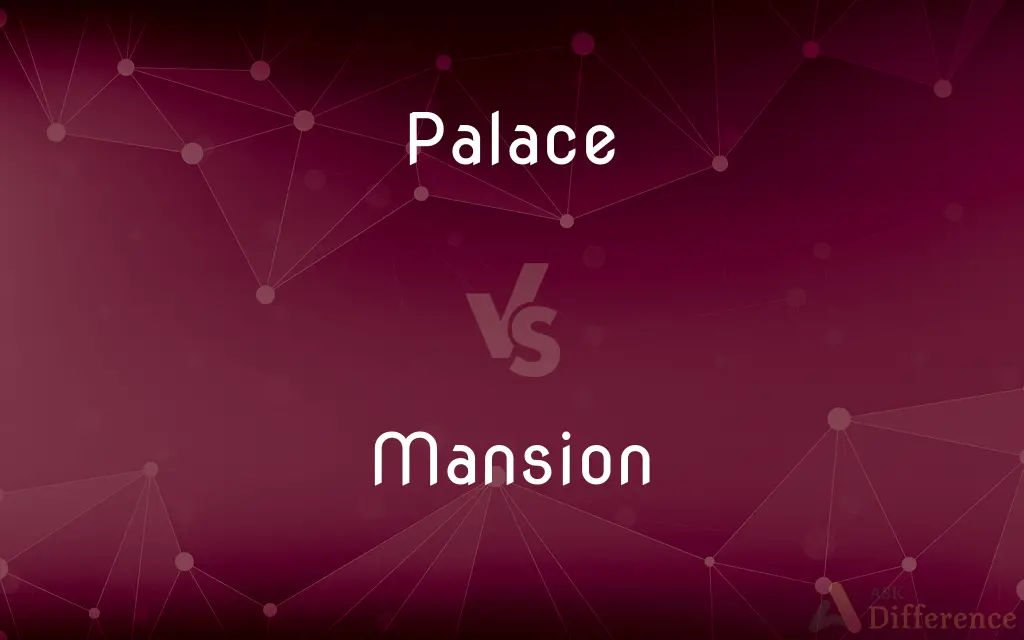Palace vs. Mansion — What's the Difference?
By Tayyaba Rehman — Updated on October 3, 2023
Palace is an official residence of a sovereign or important religious figure. Mansion is a large, impressive private residence, often with historic or architectural significance.

Difference Between Palace and Mansion
Table of Contents
ADVERTISEMENT
Key Differences
A Palace is primarily recognized as an official residence, typically belonging to royalty, a head of state, or significant religious figures. Conversely, a Mansion is an expansive and luxurious private residence, which may or may not have historical significance.
While both a Palace and a Mansion are large and grandiose in structure, their primary distinguishing factor lies in their usage and ownership. Palaces are often symbols of power, state, and official ceremonies. In contrast, Mansions symbolize personal wealth, luxury, and often the architectural tastes of their private owners.
Historically, Palaces have played pivotal roles as centers of administration, governance, or religious activities. They often come with attached courts, administrative buildings, or places of worship. Meanwhile, Mansions, though vast and luxurious, are primarily residential and might be accompanied by vast landscapes, gardens, or amenities tailored to the owner's desires.
Geographical location and cultural context also play a part in the distinction. In some cultures or regions, what is referred to as a Palace might look like a Mansion in another, and vice versa. However, the functional difference between an official residence and a private one generally remains.
The architecture and design of a Palace often reflect the cultural, political, or religious significance of its time and place. Mansions, on the other hand, while they can be historically significant, often emphasize personal luxury, grandeur, and individual tastes.
ADVERTISEMENT
Comparison Chart
Primary Use
Official residence for royalty, heads of state, or religious figures
Large, luxurious private residence
Symbolizes
Power, state, official ceremonies
Personal wealth, luxury
Associated Structures
Courts, administrative buildings, places of worship
Gardens, private amenities
Cultural Context
Varies; can be influenced by the region's political or religious significance
Primarily influenced by personal tastes
Ownership
Typically state-owned or religious institutions
Privately owned
Compare with Definitions
Palace
Grand building associated with power or governance
The president's Palace was heavily guarded.
Mansion
Large home with historical or architectural significance
The Mansion dated back to the 18th century.
Palace
Residence with attached courts or places of worship
The Palace complex also housed a magnificent chapel.
Mansion
Expansive, luxurious private residence
The billionaire's Mansion overlooked the sea.
Palace
Architectural structure symbolizing cultural or religious significance
The Palace stood tall, representing the empire's glory.
Mansion
Grand dwelling with vast landscapes or gardens
The Mansion had manicured gardens stretching for acres.
Palace
Building or complex for state or official ceremonies
Dignitaries from around the world were invited to the Palace.
Mansion
Symbol of individual wealth or stature
Owning such a Mansion was a clear sign of his success.
Palace
A palace is a grand residence, especially a royal residence, or the home of a head of state or some other high-ranking dignitary, such as a bishop or archbishop. The word is derived from the Latin name palātium, for Palatine Hill in Rome which housed the Imperial residences.
Mansion
Property emphasizing personal luxury and grandeur
Every corner of the Mansion was a testament to opulence.
Palace
The official residence of a royal personage or other high dignitary.
Mansion
A mansion is a large dwelling house. The word itself derives through Old French from the Latin word mansio "dwelling", an abstract noun derived from the verb manere "to dwell".
Palace
A large or splendid residence.
Mansion
A large, impressive house.
Palace
A large, often gaudily ornate building used for entertainment or exhibitions.
Mansion
A large stately house.
Palace
Official residence of a head of state or other dignitary, especially in a monarchical or imperial governmental system.
Mansion
A manor house.
Palace
A large and lavishly ornate residence.
Mansion
A dwelling; an abode.
Palace
A large, ornate public building used for entertainment or exhibitions.
Mansion
A separate dwelling in a large house or structure.
Palace
(archaic) To decorate or ornate.
Mansion
See house.
Palace
The residence of a sovereign, including the lodgings of high officers of state, and rooms for business, as well as halls for ceremony and reception.
Mansion
Any one of the 28 divisions of the moon's monthly path.
Palace
The official residence of a bishop or other distinguished personage.
Mansion
A large house or building, usually built for the wealthy.
Palace
Loosely, any unusually magnificent or stately house.
Mansion
(UK) A luxurious flat (apartment).
Palace
A large and stately mansion
Mansion
An apartment building.
Palace
The governing group of a kingdom;
The palace issued an order binding on all subjects
Mansion
(obsolete) A house provided for a clergyman; a manse.
Palace
A large ornate exhibition hall
Mansion
(obsolete) A stopping-place during a journey; a stage.
Palace
Official residence of an exalted person (as a sovereign)
Mansion
(historical) An astrological house; a station of the moon.
Palace
Official residence of royalty or notable figures
The queen resides in the Palace.
Mansion
(Chinese astronomy) One of twenty-eight sections of the sky.
Mansion
An individual habitation or apartment within a large house or group of buildings. (Now chiefly in allusion to John 14:2.)
Mansion
Any of the branches of the Rastafari movement.
Mansion
A dwelling place, - whether a part or whole of a house or other shelter.
In my Father's house are many mansions.
These poets near our princes sleep,And in one grave their mansions keep.
Mansion
The house of the lord of a manor; a manor house; hence: Any house of considerable size or pretension.
Mansion
A twelfth part of the heavens; a house. See 1st House, 8.
Mansion
The place in the heavens occupied each day by the moon in its monthly revolution.
The eight and twenty mansionsThat longen to the moon.
Mansion
To dwell; to reside.
Mansion
(astrology) one of 12 equal areas into which the zodiac is divided
Mansion
A large and imposing house
Common Curiosities
Can a palace be privately owned?
While Palaces are typically state-owned or linked to religious institutions, some might be privately owned, especially if they've been sold or repurposed.
Are mansions always modern constructions?
No, many Mansions have historical significance and can date back centuries.
Can a mansion be as big as a palace?
Yes, some Mansions can rival the size of Palaces, but they remain private residences.
Are all palaces owned by royalty?
No, while many Palaces are associated with royalty, some belong to religious figures or heads of state.
Is every large house a mansion?
Not necessarily; Mansions are not just large but also luxurious and often historically or architecturally significant.
How does the architecture of a palace differ from a mansion?
While Palaces often reflect cultural or political significance, Mansions highlight personal luxury and individual tastes.
What's the primary purpose of a palace?
A Palace serves as an official residence and often as a center for governance, ceremonies, or religious activities.
Do all rich people live in mansions?
No, wealth doesn't always translate to living in a Mansion; it's a personal choice.
Share Your Discovery

Previous Comparison
Cot vs. Crib
Next Comparison
Ivory vs. EcruAuthor Spotlight
Written by
Tayyaba RehmanTayyaba Rehman is a distinguished writer, currently serving as a primary contributor to askdifference.com. As a researcher in semantics and etymology, Tayyaba's passion for the complexity of languages and their distinctions has found a perfect home on the platform. Tayyaba delves into the intricacies of language, distinguishing between commonly confused words and phrases, thereby providing clarity for readers worldwide.














































